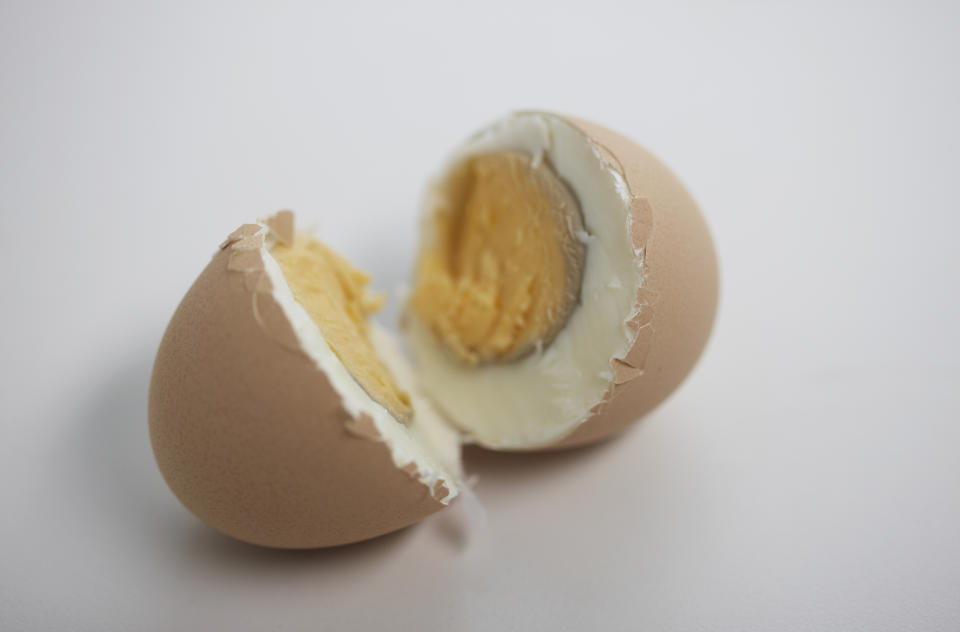How long are hard-boiled eggs good for? How to store them for optimal freshness

Love them or hate them, there’s no denying that eggs have always been one of the most versatile foods available. In fact, hard-boiled eggs date all the way back to Ancient Rome. Legend has it they were invented around 5,000 B.C. when pottery was invented. After all, Ancient Romans needed a vessel to boil the water in.
Whether you boil them for eight minutes or 10 minutes, you probably appreciate how simple it is to prepare hard-boiled eggs. And unlike omelets or scrambled eggs, they’re acceptable to have at every meal and even in between meals. Hard-boiled eggs are a staple at breakfast buffets, a protein-packed snack any time of the day — there are 13 grams of protein in just one hard-boiled egg — and the hero of many salads including the aptly named egg salad and the classic Cobb salad.
Mayo-Free Herby Egg Salad by Elena Besser
They’re also behind an hors d'oeuvre so beloved it even has its own holiday. Mark your calendars because Nov. 2 is National Deviled Egg Day. (If you plan on celebrating it, check out this hard-boiled egg slicing hack that went viral on TikTok.)
For as great as they are, however, hard-boiled eggs are far from perfect. Like most foods they have a shelf life. And as anyone who's accidentally left a boiled egg sitting out for too long knows, when an egg goes rotten, it's not a pretty sight ... or smell. Because of its unique sulfuric stench, you can often smell a rotten egg before you see it.
The absolute best way to tell if your hard-boiled egg has turned is to trust your nose and your gut. If it smells dodgy, count your losses and toss it. But if you don't trust your sense of smell, here's what you should know about how long hard-boiled eggs usually last.
The Best, Easiest Deviled Eggs by Elena Besser
To peel or not to peel?
While raw eggs can last three to five weeks in the refrigerator, according to the U.S. Food and Drug Administration, hard-boiled eggs in or out of their shells should be consumed within a week after cooking. The reason they don’t last as long is because the cooking process compromises the shell's protective coating. Bacteria is then able to get inside through the open pores and contaminate the egg.
One way to make sure any hard-boiled eggs are used up within a week is to write the date on the shell or the carton when you boil them. However, if you buy pre-peeled eggs, you have less time to enjoy them. Fortunately, most store-bought goods come with expiration dates. For example, the label on a package of Great Day Farms Hard Boiled Eggs advises eating the pre-peeled eggs within two to three days of opening the package.
Hard-Boiled Egg by Geoffrey Zakarian
One exception to the week-long rule is soft-boiled eggs. These are eggs that are only boiled for four to six minutes.
"Soft boiled eggs spoil faster," Emily Rubin RD, LDN at Thomas Jefferson University Division of Gastroenterology and Hepatology tells TODAY.com. If you don't eat soft-boiled eggs right after cooking them, it's OK to keep them in their shell and refrigerate them for up to two days. While the whole point of a soft-boiled egg is to have a creamy yolk, Rubin isn't a fan of the technique. "To prevent salmonella, cook eggs thoroughly so that both the yolk and white are firm."
How to store hard-boiled eggs
"Hard-boiled eggs should be refrigerated within two hours of cooking and discarded if left out for more than two hours at room temperature," says Rubin. She recommends leaving them in the fridge in their shells for optimal taste and quality and only peeling them right before you’re ready to eat them.
Eggs that are hard to peel are certainly frustrating, but they’re not a red flag. According to the USDA, the harder it is to peel, the fresher the egg was at the time it was boiled.
While it can be tempting to freeze them to make them last longer, hard-boiled eggs in their entirety aren't freezer-friendly. The egg whites become rubbery and take on an unpleasant texture when defrosted. It is possible, however, to freeze cooked egg yolks. If you go that route, the American Egg Board recommends boiling the yolks again, but separately, prior to freezing them.
How to tell if hard-boiled eggs have gone bad
According to Rubin, the best way to tell if hard-boiled eggs have gone bad is to smell them, especially if they’ve been in your fridge for around seven days.
"Of course, smell may be hard to determine because hard-boiled eggs already have a strong smell," she says. "But basically you want to discard any eggs with an unusual smell." If you’re unsure or have lost your sense of smell, definitely get a second opinion if you can.

She also strongly advises discarding any discolored eggs, but says you don't have to worry about the green ring that sometimes appears around the yolk. This color comes from a natural reaction between the iron in the egg yolk and the hydrogen sulfide in the egg white. All it really means is that the egg was overcooked. While it’s certainly unsightly, it's not dangerous.
However, if the yolk or egg white have dark brown, black or green spots on them, it may be a sign that they have come into contact with some type of bacteria like salmonella. Toss these eggs immediately as they’re not safe for consumption.
This article was originally published on TODAY.com

